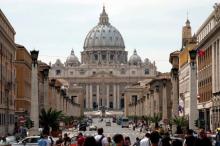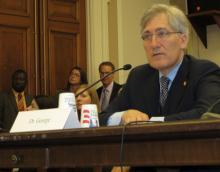the Islamic State

Ahmed Abdelsattar was 14 when Islamic State swept into Mosul and declared a caliphate in 2014. Fearing he would be indoctrinated and sent to fight by the militants, his parents took him out of school.
Three years later, he sells ice cream at a refugee camp for internally displaced Iraqis. His family have lost their home, and his father is too old for the manual labor positions at the camp, which means he is his family's sole breadwinner.

President Trump, long-chided for failing to address a surge in hate crimes, began his first address to Congress by invoking Black History Month, and condemning recent threats against Jewish institutions and the shooting of Indian men in Kansas City.

The Italian government is on high alert after threats from the Islamic State called Italy “the nation signed with the blood of the cross.”
Italy is one of a handful of major Western counties that has not been victim of a large-scale terror assault since the Sept. 11 attacks in the U.S.
Italian officials fear extremists could enter the country amid the growing tide of refugees arriving by boat from North Africa. About 500 extra troops have been stationed to guard symbolic targets in Rome and monitor the streets of the capital for suspicious activity.
The video threat, released with images of 21 Coptic Christians from Egypt who were beheaded this month, warned that Islamic State forces were “south of Rome,” in Libya. At its closest point, Libya is little more than 100 miles from the Italian islands of Sicily and Sardinia.
This comes four months after the Islamic State’s propaganda magazine Dabiq ran a cover photo of the militant group’s flag flying above the obelisk in St. Peter’s Square in the Vatican with the headline: “The failed crusade.”

A coalition of more than 50 religious leaders, led by mostly conservative Catholic, evangelical, and Jewish activists, is calling on President Obama to sharply escalate military action against Islamic extremists in Iraq. They say “nothing short of the destruction” of the Islamic State can protect Christians and religious minorities now being subjected to “a campaign of genocide.”
“We represent various religious traditions and shades of belief,” the petition reads. “None of us glorifies war or underestimates the risks entailed by the use of military force.”
But they say the situation is so dire that relief for these religious communities “cannot be achieved apart from the use of military force to degrade and disable” the Islamic State forces.
The petition was organized by Robert P. George, a prominent Catholic conservative and Republican activist, and he was joined by a range of other leaders, many of whom are known for their hawkish views on foreign policy.